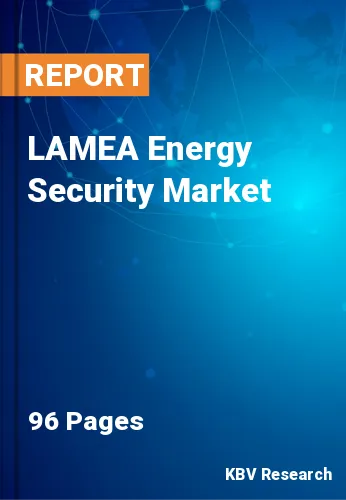The Latin America, Middle East and Africa Energy Security Market would witness market growth of 15.2% CAGR during the forecast period (2022-2028).
The energy security business is trending toward a radical shift due to rising energy demands in emerging markets, enhanced administration, and destabilizing power foundations. Enhanced administration stress and safety compliance and regulations, an increase in cyber-attacks and terrorist threats, as well as physical intrusions and insider dangers, are a few of the main reasons driving market expansion.
Developing economies are focusing on optimal resource utilization to support their economies, which is anticipated to drive the energy security market throughout the forecast period. Natural disasters and geopolitical conflicts have the potential to disrupt energy markets. The need to meet this rising demand by organizations and modern establishments around the world is anticipated to boost market expansion over the forecast period.
Long-term energy safety refers to the time investment to deliver energy alongside sustainable environmental needs and economic development, whilst short-term energy safety refers to the system's ability to respond to shifts in the demand-supply balance. The growing demand for preserving existing energy infrastructure and resources in industrialized nations and expanding pipeline infrastructure is anticipated to create significant potential prospects for the energy security industry.
In this region, the United Arab Emirates is renowned for having one of the world's highest rates of solar exposure, which offers significant potential for developing renewable energy. The country has traditionally depended on conventional energy sources because it has significant indigenous oil and gas reserves. However, economic diversification has been pushed to avoid the dramatic commodity downturns linked to an economy centered on oil, resulting in new incentives and introducing the most cutting-edge renewable energy technologies. Moreover, the fast industrialization, expanding population, and rising requirement from water desalination plants have increased energy needs and prompted input diversification requests.
The Brazil market dominated the LAMEA Energy Security Market by Country in 2021, and would continue to be a dominant market till 2028; thereby, achieving a market value of $566.8 Million by 2028. The Argentina market is exhibiting a CAGR of 15.8% during (2022 - 2028). Additionally, The UAE market would experience a CAGR of 14.8% during (2022 - 2028).
Based on Component, the market is segmented into Solution, and Services. Based on Technology, the market is segmented into Physical Security, and Network Security. Based on Power Plant, the market is segmented into Thermal & Hydro, Renewable Energy, Oil & Gas, and Others. Based on countries, the market is segmented into Brazil, Argentina, UAE, Saudi Arabia, South Africa, Nigeria, and Rest of LAMEA.
Free Valuable Insights: The Worldwide Energy Security Market is Projected to reach USD 30.6 Billion by 2028, at a CAGR of 10.2%
The market research report covers the analysis of key stake holders of the market. Key companies profiled in the report include Siemens AG, Teledyne FLIR LLC (Teledyne Technologies Incorporated), ABB Ltd., Honeywell International, Inc., BAE Systems PLC, Elbit Systems Ltd., Thales Group S.A., Hexagon AB, Lockheed Martin Corporation and AEGIS Security & Investigations Inc.
By Component
By Technology
By Power Plant
By Country
Our team of dedicated experts can provide you with attractive expansion opportunities for your business.

